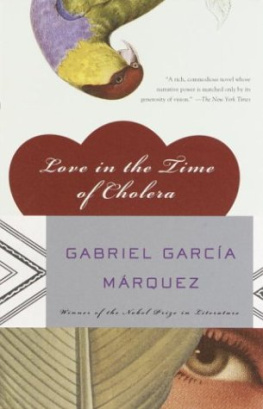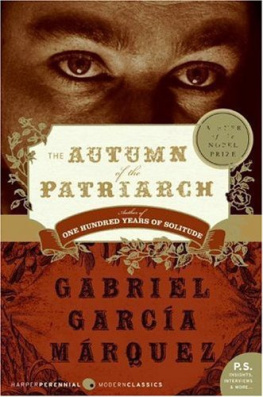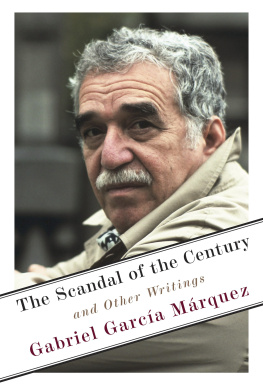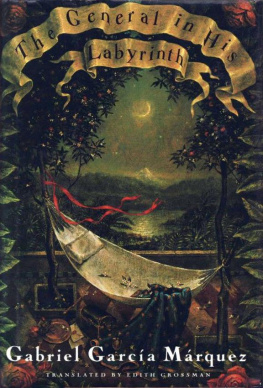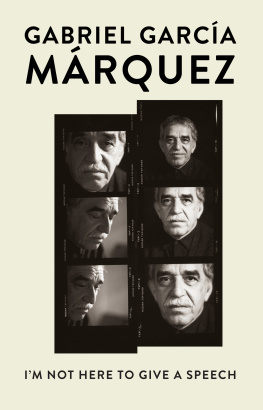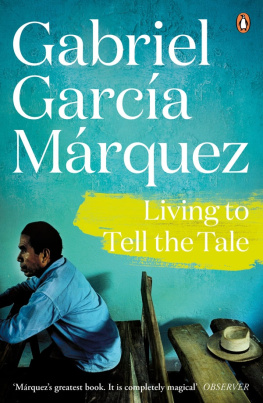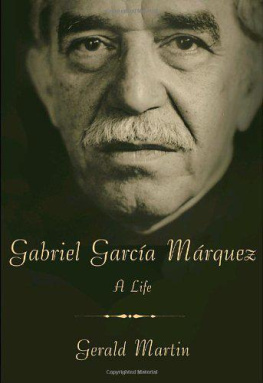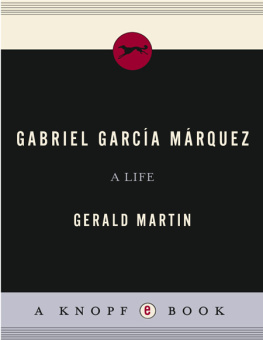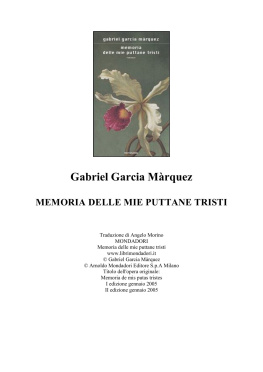Gabriel Garcia Marquez - Love in the Time of Cholera
Here you can read online Gabriel Garcia Marquez - Love in the Time of Cholera full text of the book (entire story) in english for free. Download pdf and epub, get meaning, cover and reviews about this ebook. year: 2007, publisher: Vintage, genre: Detective and thriller. Description of the work, (preface) as well as reviews are available. Best literature library LitArk.com created for fans of good reading and offers a wide selection of genres:
Romance novel
Science fiction
Adventure
Detective
Science
History
Home and family
Prose
Art
Politics
Computer
Non-fiction
Religion
Business
Children
Humor
Choose a favorite category and find really read worthwhile books. Enjoy immersion in the world of imagination, feel the emotions of the characters or learn something new for yourself, make an fascinating discovery.
- Book:Love in the Time of Cholera
- Author:
- Publisher:Vintage
- Genre:
- Year:2007
- Rating:4 / 5
- Favourites:Add to favourites
- Your mark:
- 80
- 1
- 2
- 3
- 4
- 5
Love in the Time of Cholera: summary, description and annotation
We offer to read an annotation, description, summary or preface (depends on what the author of the book "Love in the Time of Cholera" wrote himself). If you haven't found the necessary information about the book — write in the comments, we will try to find it.
Gabriel Garcia Marquez: author's other books
Who wrote Love in the Time of Cholera? Find out the surname, the name of the author of the book and a list of all author's works by series.
Love in the Time of Cholera — read online for free the complete book (whole text) full work
Below is the text of the book, divided by pages. System saving the place of the last page read, allows you to conveniently read the book "Love in the Time of Cholera" online for free, without having to search again every time where you left off. Put a bookmark, and you can go to the page where you finished reading at any time.
Font size:
Interval:
Bookmark:
Gabriel Garca Mrquez
Love in the Time of Cholera
1985
A novel about the attempts of an old man and woman to rekindle their childhood love affair, set on the Columbian coast.
I T WAS INEVITABLE: the scent of bitter almonds always reminded him of the fate of unrequited love. Dr. Juvenal Urbino noticed it as soon as he entered the still darkened house where he had hurried on an urgent call to attend a case that for him had lost all urgency many years before. The Antillean refugee Jeremiah de Saint-Amour, disabled war veteran, photographer of children, and his most sympathetic opponent in chess, had escaped the torments of memory with the aromatic fumes of gold cyanide.
He found the corpse covered with a blanket on the campaign cot where he had always slept, and beside it was a stool with the developing tray he had used to vaporize the poison. On the floor, tied to a leg of the cot, lay the body of a black Great Dane with a snow-white chest, and next to him were the crutches. At one window the splendor of dawn was just beginning to illuminate the stifling, crowded room that served as both bedroom and laboratory, but there was enough light for him to recognize at once the authority of death. The other windows, as well as every other chink in the room, were muffled with rags or sealed with black cardboard, which increased the oppressive heaviness. A counter was crammed with jars and bottles without labels and two crumbling pewter trays under an ordinary light bulb covered with red paper. The third tray, the one for the fixative solution, was next to the body. There were old magazines and newspapers everywhere, piles of negatives on glass plates, broken furniture, but everything was kept free of dust by a diligent hand. Although the air coming through the window had purified the atmosphere, there still remained for the one who could identify it the dying embers of hapless love in the bitter almonds. Dr. Juvenal Urbino had often thought, with no premonitory intention, that this would not be a propitious place for dying in a state of grace. But in time he came to suppose that perhaps its disorder obeyed an obscure determination of Divine Providence.
A police inspector had come forward with a very young medical student who was completing his forensic training at the municipal dispensary, and it was they who had ventilated the room and covered the body while waiting for Dr. Urbino to arrive. They greeted him with a solemnity that on this occasion had more of condolence than veneration, for no one was unaware of the degree of his friendship with Jeremiah de Saint-Amour. The eminent teacher shook hands with each of them, as he always did with every one of his pupils before beginning the daily class in general clinical medicine, and then, as if it were a flower, he grasped the hem of the blanket with the tips of his index finger and his thumb, and slowly uncovered the body with sacramental circumspection. Jeremiah de Saint-Amour was completely naked, stiff and twisted, eyes open, body blue, looking fifty years older than he had the night before. He had luminous pupils, yellowish beard and hair, and an old scar sewn with baling knots across his stomach. The use of crutches had made his torso and arms as broad as a galley slaves, but his defenseless legs looked like an orphans. Dr. Juvenal Urbino studied him for a moment, his heart aching as it rarely had in the long years of his futile struggle against death.
Damn fool, he said. The worst was over.
He covered him again with the blanket and regained his academic dignity. His eightieth birthday had been celebrated the year before with an official three-day jubilee, and in his thank-you speech he had once again resisted the temptation to retire. He had said: Ill have plenty of time to rest when I die, but this eventuality is not yet part of my plans. Although he heard less and less with his right ear, and leaned on a silver-handled cane to conceal his faltering steps, he continued to wear a linen suit, with a gold watch chain across his vest, as smartly as he had in his younger years. His Pasteur beard, the color of mother-of-pearl, and his hair, the same color, carefully combed back and with a neat part in the middle, were faithful expressions of his character. He compensated as much as he could for an increasingly disturbing erosion of memory by scribbling hurried notes on scraps of paper that ended in confusion in each of his pockets, as did the instruments, the bottles of medicine, and all the other things jumbled together in his crowded medical bag. He was not only the citys oldest and most illustrious physician, he was also its most fastidious man. Still, his too obvious display of learning and the disingenuous manner in which he used the power of his name had won him less affection than he deserved.
His instructions to the inspector and the intern were precise and rapid. There was no need for an autopsy; the odor in the house was sufficient proof that the cause of death had been the cyanide vapors activated in the tray by some photographic acid, and Jeremiah de Saint-Amour knew too much about those matters for it to have been an accident. When the inspector showed some hesitation, he cut him off with the kind of remark that was typical of his manner: Dont forget that I am the one who signs the death certificate. The young doctor was disappointed: he had never had the opportunity to study the effects of gold cyanide on a cadaver. Dr. Juvenal Urbino had been surprised that he had not seen him at the Medical School, but he understood in an instant from the young mans easy blush and Andean accent that he was probably a recent arrival to the city. He said: There is bound to be someone driven mad by love who will give you the chance one of these days. And only after he said it did he realize that among the countless suicides he could remember, this was the first with cyanide that had not been caused by the sufferings of love. Then something changed in the tone of his voice.
And when you do find one, observe with care, he said to the intern: they almost always have crystals in their heart.
Then he spoke to the inspector as he would have to a subordinate. He ordered him to circumvent all the legal procedures so that the burial could take place that same afternoon and with the greatest discretion. He said: I will speak to the Mayor later. He knew that Jeremiah de Saint-Amour lived in primitive austerity and that he earned much more with his art than he needed, so that in one of the drawers in the house there was bound to be more than enough money for the funeral expenses.
But if you do not find it, it does not matter, he said. I will take care of everything. He ordered him to tell the press that the photographer had died of natural causes, although he thought the news would in no way interest them. He said: If it is necessary, I will speak to the Governor. The inspector, a serious and humble civil servant, knew that the Doctors sense of civic duty exasperated even his closest friends, and he was surprised at the ease with which he skipped over legal formalities in order to expedite the burial. The only thing he was not willing to do was speak to the Archbishop so that Jeremiah de Saint-Amour could be buried in holy ground. The inspector, astonished at his own impertinence, attempted to make excuses for him.
I understood this man was a saint, he said. Something even rarer, said Dr. Urbino. An atheistic saint. But those are matters for God to decide.
In the distance, on the other side of the colonial city, the bells of the Cathedral were ringing for High Mass. Dr. Urbino put on his half-moon glasses with the gold rims and consulted the watch on its chain, slim, elegant, with the cover that opened at a touch: he was about to miss Pentecost Mass.
In the parlor was a huge camera on wheels like the ones used in public parks, and the backdrop of a marine twilight, painted with homemade paints, and the walls papered with pictures of children at memorable moments: the first Communion, the bunny costume, the happy birthday. Year after year, during contemplative pauses on afternoons of chess, Dr. Urbino had seen the gradual covering over of the walls, and he had often thought with a shudder of sorrow that in the gallery of casual portraits lay the germ of the future city, governed and corrupted by those unknown children, where not even the ashes of his glory would remain.
Next pageFont size:
Interval:
Bookmark:
Similar books «Love in the Time of Cholera»
Look at similar books to Love in the Time of Cholera. We have selected literature similar in name and meaning in the hope of providing readers with more options to find new, interesting, not yet read works.
Discussion, reviews of the book Love in the Time of Cholera and just readers' own opinions. Leave your comments, write what you think about the work, its meaning or the main characters. Specify what exactly you liked and what you didn't like, and why you think so.

